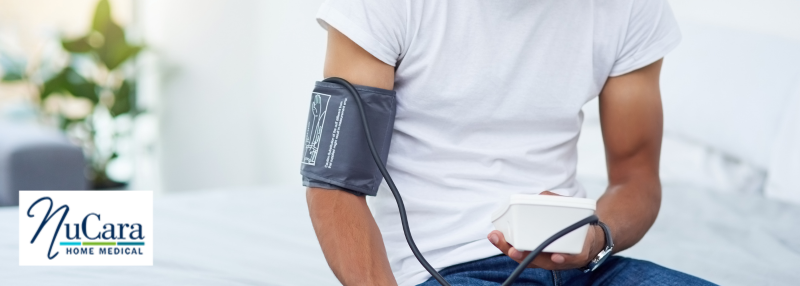NuCara Home Medical
Updated Wed November 26, 2025
Published Under: Sleep Apnea

February is American Heart Month, a time to focus on cardiovascular health and raise awareness about the risks of heart disease. Did you know that sleep apnea can significantly impact your blood pressure, increasing your risk of heart disease? Let's delve deeper into this important connection.
What is Sleep Apnea?
Sleep apnea is a common sleep disorder characterized by repeated episodes of shallow or paused breathing during sleep. There are three main types of sleep apnea:
- Obstructive Sleep Apnea (OSA): The most common type, caused by a blockage of the airway, usually due to excess tissue or obesity.
- Central Sleep Apnea (CSA): Caused by a lack of respiratory effort, often due to a neurological condition or certain medications.
- Mixed Sleep Apnea: A combination of OSA and CSA.
The Link Between Sleep Apnea and Blood Pressure
Research has shown that sleep apnea can have a significant impact on blood pressure. In fact, studies suggest that:
- 30-70% of people with sleep apnea also have high blood pressure.
- People with sleep apnea are more likely to develop high blood pressure, even if they don't have it initially.
- Treating sleep apnea can help lower blood pressure in people with hypertension.
How Does Sleep Apnea Affect Blood Pressure?
Here are some ways in which sleep apnea affects blood pressure:
- Intermittent Hypoxia: Repeated episodes of low oxygen levels during sleep apnea can lead to increased blood pressure. When breathing stops, oxygen levels drop, causing the body to release stress hormones that raise blood pressure.
- Increased Sympathetic Nervous System Activity: Sleep apnea can activate the body's "fight or flight" response, increasing heart rate and blood pressure. This response is meant to protect the body but can lead to chronic hypertension if triggered repeatedly.
- Inflammation and Oxidative Stress: Sleep apnea can lead to chronic inflammation and oxidative stress, which can damage blood vessels and increase blood pressure. This damage can make it harder for blood to flow smoothly, further raising blood pressure.
The Risks of Untreated Sleep Apnea and High Blood Pressure
Untreated sleep apnea and high blood pressure can lead to serious health consequences, including:
- Heart Disease: High blood pressure can damage blood vessels, increasing the risk of heart attacks, strokes, and heart failure.
- Kidney Disease: Uncontrolled high blood pressure can damage kidney function, leading to chronic kidney disease.
- Cognitive Impairment: Sleep apnea and high blood pressure can increase the risk of cognitive decline and dementia.
Diagnosing and Treating Sleep Apnea
Diagnosing sleep apnea typically involves a sleep study, either at a sleep center or at home. During a sleep study, various body functions are monitored, including breathing patterns, heart rate, and blood oxygen levels.
Treatment options for sleep apnea include:
- Continuous Positive Airway Pressure (CPAP): A machine that delivers air pressure through a mask to keep the airway open during sleep.
- BiLevel Positive Airway Pressure: Similar to CPAP but provides different pressures for inhalation and exhalation.
- Oral Appliances: Devices worn in the mouth to keep the airway open.
- Lifestyle Changes: Weight loss, quitting smoking, and avoiding alcohol can help reduce sleep apnea symptoms.
- Surgery: In severe cases, surgery may be needed to remove excess tissue or correct structural problems in the airway.
Take Control of Your Health This Heart Month with Nucara
Take better care of your health by staying consistent with your sleep apnea treatment and using your CPAP machine regularly. NuCara offers easy CPAP resupply and a wide range of products to ensure you have everything you need for effective treatment. Don't wait until it's too late. Let's work together to take control of your health this Heart Month!
View PAP Products
Comments